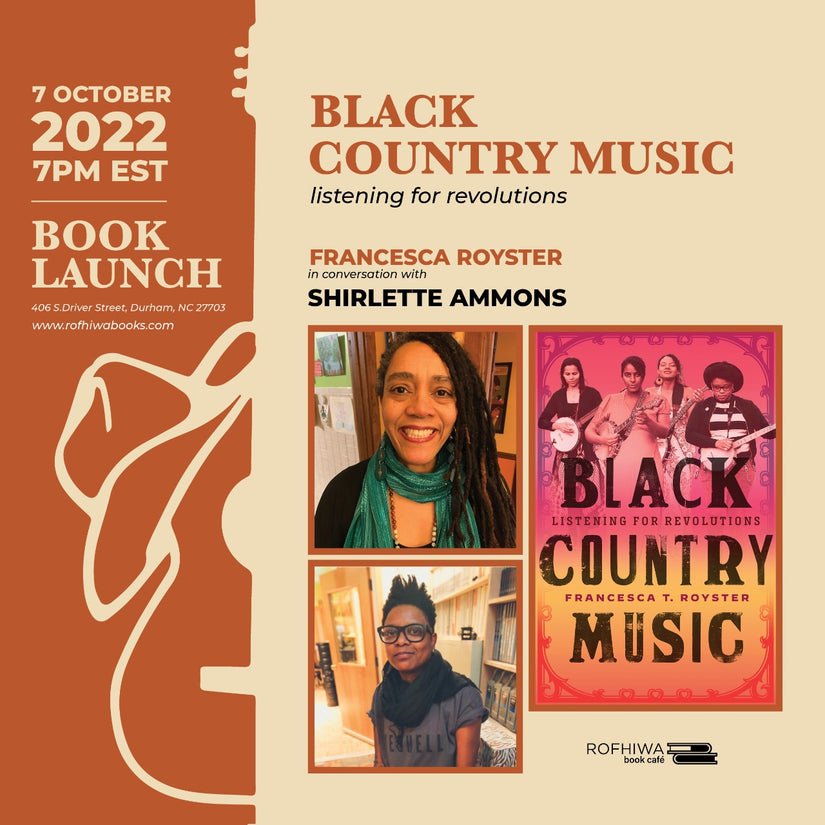
Save My Spot
Please join us for an evening with Francesca Royster and Durham musician, Shirlette Ammons as we launch Royster's monumental book, Black Country Music: Listening for Revolutions. In this timely work—the first book on Black country music by a Black writer—Francesca Royster uncovers the Black performers and fans, including herself, who are exploring the pleasures and possibilities of the genre.
We look forward to your presence at Rofhiwa for an evening of music and conversation. This is an in-person, in store event.
Registration:
We will offer seating for up to 35 in-person guests, with priority access given to those who purchase the book. To register for the in person in store event, click on "Save My Spot" and purchase your hardcover. This will ensure that your seat is reserved on the day of the event.
About Francesca T. Royster:
Francesca Royster is Professor and chair of English at DePaul University, where she teaches courses in Shakespeare Studies, Performance Studies, Critical Race theory, Gender and Queer Theory and African American Literature. She received her PhD in English from University of California, Berkeley in 1995. She is the author of Becoming Cleopatra: The Shifting Image of an Icon (Palgrave/MacMillan in 2003) and Sounding Like a No-No: Queer Sounds and Outrageous Acts in the Post-Soul Era (University of Michigan, 2013), which won Honorable Mention in the Modern Language Association’s William Sanders Scarborough Prize for an Outstanding Scholarly Study of African American Literature or Culture. She has also published numerous book chapters and scholarly essays in Biography, Journal of Popular Music Studies, Shakespeare Quarterly, Shakespeare Studies, Text and Performance Studies, Performance Research International and Women in Performance, among others.
About Shirlette Ammons:
Shirlette Ammons is a Durham, NC-based musician whose sophomore solo album, Language Barrier was co-released by SugarQube Records and Churchkey Records in February 2016. The album features guest appearances by The Indigo Girls, Meshell Ndegeocello among others. Shirlette’s first solo album, Twilight For Gladys Bentley, was released in 2012 and is a ‘re-imagining,’ of 1920′s blues singer, Gladys Bentley. She is also vocalist for the hip hop rock band Mosadi Music whose debut album, The Window, vocalist for the fusion electronic duo, Jon Anonymous. Shirlette’s first poetry collection entitled Stumphole: Aunthology of Backwoods Blood was published by Big Drum Press in 2002. In 2008, Matching Skin featuring The John Anoynmous EP was published by Carolina Wren Press. Her literary work has appeared in The Ringing Ear: Black Poets Lean South, What Your Momma Never Tod You: True Stories About Love and Sex, The Asheville Revielw and The Journal of the Academy of American Poets amongst other publications. She has recieved a John Hope Franklin Grant for Documentary Studies, The Ebony Harlem Award for Literary Achievement, as well as Emerging Artist Grants from the Durham Arts COuncil and the United Arts Council.
Black Country Music: Listening for Revolutions
After a century of racist whitewashing, country music is finally reckoning with its relationship to Black people. In this timely work—the first book on Black country music by a Black writer—Francesca Royster uncovers the Black performers and fans, including herself, who are exploring the pleasures and possibilities of the genre.
Informed by queer theory and Black feminist scholarship, Royster’s book elucidates the roots of the current moment found in records like Tina Turner’s first solo album, Tina Turns the Country On! She reckons with Black “bros” Charley Pride and Darius Rucker, then chases ghosts into the future with Valerie June. Indeed, it is the imagination of Royster and her artists that make this music so exciting for a genre that has long been obsessed with the past. The futures conjured by June and others can be melancholy, and are not free of racism, but by centering Black folk Royster begins to understand what her daughter hears in the banjo music of Our Native Daughters and the trap beat of Lil Nas X’s “Old Town Road.” A Black person claiming country music may still feel a bit like a queer person coming out, but, collectively, Black artists and fans are changing what country music looks and sounds like—and who gets to love it.
Save My Spot
Export
Import
